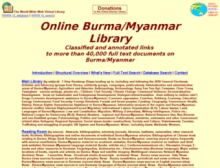Resource information
CONCLUSION:
"A developing country like Lao PDR is struggling to gain recognition from other countries
in the world. This requires that the country applies a human rights perspective to
governance of land. In this case the land rights are the rights of the ethnic groups in the
uplands that practice customary communal tenure. These groups would like the
government to accept and register their communal land use legally. The first step
towards this is in the development of the National Land Use Policy which is still in draft.
This study provides evidence-based arguments for the inclusion of a respect for
customary communal tenure in the land policy.
The field study on communal tenure in Houaphan can serve the government in terms of
integration of local land governance aspects into its development planning process. The
research has brought an increased understanding on biological characteristics of the
common resources and how communities use and manage such resources in a way that
everyone including how the poor share benefits and responsibilities to keep the
resource sustainable and thus contribute to the national land management process.
The research analyzed how local ethnic group farmers in Houaphan view the resources
that they have traditionally used as the property of their community. They have
communally organized institutions that provide sufficient incentives to ensure equity in
access to land and for the farmers to invest in enhancing the productivity of the
resource system through internal rules that assign rights to individual households,
while protecting the outer boundaries. These rules are oral internal rules. They are
collectively created, used and developed by generations of villagers. The internal rules
include characteristics of natural and social aspects and they support the improvement
of local life in terms of protection of the resources for future use.
The research has found that the communal tenure system in Houaphan is slowly
affected by legal land and forest management activities of the government, particularly
where the government does not integrate local practice of use and management of local
resources of local ethnic people.
Currently, many international and local business investors are looking at natural
resources in Houaphan province as business destination. Evidence-based research
result shows that it is necessary to protect the land of the ethnic groups to safeguard
against land loss to business activities which may be planned without considering
existing communal tenure. Many local communities will lose their customary rights to
their common property resources and the country will at the later stage have to address
more complicated political issues if local communities see that they are losing land to
outsiders.
The evidence-based findings of this research suggest an option that communal tenure
rights of local communities in Houaphan should be legally recognised along with
provision of clear set of management rules and the formation of the village as a legal
entity to fully exercise the management of the resources through an issuance of
communal titles to the land parcels that make up the common property of the village.
The communal tenure should include the fallows of the shifting cultivation uplands and
all the customary communal tenure of upland and lower land communities. The cultural
and social dimension of communal land use is a critical aspect to consider in order to
work out strategies for the future development of rural life in the province. This will lay
a foundation for local people to improve their social-economic condition and ensure
their participation in the country’s development process.
The study has applied selectively the theory of Thomas Højrup to form a macro view of
the country’s development process in the remote areas. As part of the interpellation
conditions highlighted by Højrup, the country is experiencing a profound process of
transformation. The Government of Laos organizes local societies and re-arranges land
and forests in order to transform a traditional subsistence economy to a market
economy.
In practice, interpellation does not always turns out successfully because many
economic development activities destroy a local practice that is worth preserving in
terms of livelihood and human rights of the communities. This happens in particular
where traditional common property systems are found and the systems that have
existed long before Lao PDR came into being.
The transformation means change and this change is a question that needs to be clearly
answered before communities agree to participate in the development process. Where
such change is proposed by outsiders, local people need to know that it brings to them
better results in comparison to what they already have. Otherwise they are reluctant to
participate in the country’s transformation process as they value their own customary
ways. This reveals that not only the country’s worldview, but also the view of local
people towards how communal resources should be managed is important for the
transformation. So far the local perceptions and practices of communal tenure is not
widely understood by government officers and the more studies that are carried out to
feed into the finalization of the land policy and new land law the better.


